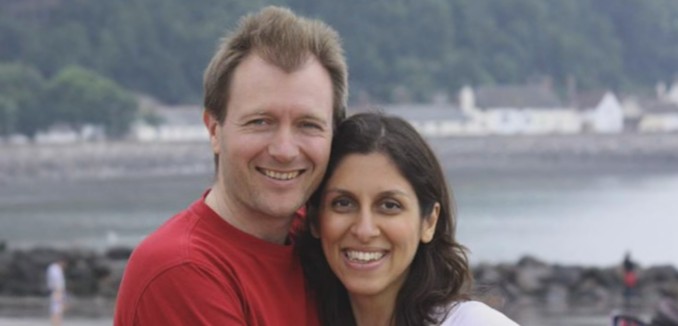A dual British-Iranian citizen who was arrested by Iranian authorities in April had her first appearance in one of Iran’s Islamic revolutionary courts on Monday but remains separated from her toddler, The Guardian reported.
Nazanin Zaghari-Ratcliffe, a charity worker who was visiting family in Iran before being arrested at the Tehran airport shortly before her scheduled departure, has been charged with seeking a “soft overthrow” of the Iranian regime.
Zaghari-Ratcliffe is “deeply upset,” her husband Richard Ratcliffe told The Guardian. “She is desperate that our daughter has been kept away from her mother and father now for four months. She is desperate to come home. She confirmed that she remains frail – she is still losing her hair, she is struggling to regain any weight. This remains a very cruel case.”
Ratcliffe dismissed the Iranian allegations that his wife seeks the overthrow of the government. “Nazanin’s case is part of a wider pattern: a number of dual nationals have been taken in an effort to justify the fiction that there is a plot of infiltration,” he said. Given that Zaghari-Ratcliffe encountered no problems on previous visits, the idea that his wife is part of a conspiracy “is not only fantasy, it is a deliberate lie.”
The judge presiding over Zaghari-Ratcliffe’s case is Abolghassem Salavati, sometimes known as the “hanging judge.” Salavati has been described by human rights organizations as having led a “crackdown on journalists and political activists.” He also presided over the case of three American hikers who were accused of espionage when they wandered too close to the Iranian border in 2009. All three were eventually freed after an estimated $1.5 million was paid in bail.
Salavati also presided over the case of Washington Post reporter Jason Rezaian last year. Rezaian was convicted of espionage last October, but was released along with four other Americans in January after the United States government released $1.7 billion in frozen Iranian assets as part of the nuclear deal.
Iran told Zaghari-Ratcliffe’s family last month to “make an arrangement” to get her released before trial, for some sort of “exchange.” Ratcliffe’s ordeal helped prompt the United Kingdom’s Foreign and Commonwealth Office to upgrade its warning to citizens not to visit Iran out of concern that they could be “arbitrarily detained.”
Last month, Iranian authorities arrested dual American-Iranian citizen Reza “Robin” Shahini, who was visiting his ailing mother. Arrests of dual nationals are frequently the work of Iran’s Islamic Revolutionary Guard Corps (IRGC), a powerful group that controls an estimated one-sixth of Iran’s economy and has been strengthened by the nuclear deal. The IRGC has arrested at least six dual nationals in the past year, Reuters reported, noting that it was “the highest number of Iranians with dual-nationality detained at one time in recent years to have been acknowledged.”
These detainees include Parviz Tanavoli, a prominent Iranian-Canadian sculptor, who was barred from leaving Iran earlier this month; Homa Hoodfar, a Canadian-Iranian scholar who was arrested earlier this year when she returned to Iran to see her family; Iranian-American businessman Siamak Namazi and his father, Baquer Namazi; British-Iranian businessman Kamal Foroughi; and Nizar Zakka, a Lebanese national with U.S. permanent residency.
“Analysts say that some of those prisoners have value for the Iranian authorities as possible bargaining chips in future swaps,” The New York Times noted while reporting on Hoodfar’s arrest.
[Photo: Free Nazanin Zaghari-Ratcliffe / YouTube ]




